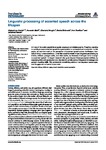Linguistic Processing of Accented Speech Across the Lifespan
| dc.contributor.author | Cristia, A | |
| dc.contributor.author | Seidl, A | |
| dc.contributor.author | Vaughn, C | |
| dc.contributor.author | Schmale, R | |
| dc.contributor.author | Bradlow, A | |
| dc.contributor.author | Floccia, Caroline | |
| dc.date.accessioned | 2017-09-18T12:42:05Z | |
| dc.date.available | 2017-09-18T12:42:05Z | |
| dc.date.issued | 2012 | |
| dc.identifier.issn | 1664-1078 | |
| dc.identifier.issn | 1664-1078 | |
| dc.identifier.uri | http://hdl.handle.net/10026.1/9939 | |
| dc.description.abstract |
In most of the world, people have regular exposure to multiple accents. Therefore, learning to quickly process accented speech is a prerequisite to successful communication. In this paper, we examine work on the perception of accented speech across the lifespan, from early infancy to late adulthood. Unfamiliar accents initially impair linguistic processing by infants, children, younger adults, and older adults, but listeners of all ages come to adapt to accented speech. Emergent research also goes beyond these perceptual abilities, by assessing links with production and the relative contributions of linguistic knowledge and general cognitive skills. We conclude by underlining points of convergence across ages, and the gaps left to face in future work. | |
| dc.format.extent | 479- | |
| dc.format.medium | Electronic-eCollection | |
| dc.language | eng | |
| dc.language.iso | eng | |
| dc.publisher | Frontiers Media SA | |
| dc.subject | accent adaptation | |
| dc.subject | aging | |
| dc.subject | childhood | |
| dc.subject | infancy | |
| dc.subject | speech perception | |
| dc.title | Linguistic Processing of Accented Speech Across the Lifespan | |
| dc.type | journal-article | |
| dc.type | Journal Article | |
| plymouth.author-url | https://www.ncbi.nlm.nih.gov/pubmed/23162513 | |
| plymouth.issue | NOV | |
| plymouth.volume | 3 | |
| plymouth.publication-status | Published online | |
| plymouth.journal | Frontiers in Psychology | |
| dc.identifier.doi | 10.3389/fpsyg.2012.00479 | |
| plymouth.organisational-group | /Plymouth | |
| plymouth.organisational-group | /Plymouth/Faculty of Health | |
| plymouth.organisational-group | /Plymouth/Faculty of Health/School of Psychology | |
| plymouth.organisational-group | /Plymouth/REF 2021 Researchers by UoA | |
| plymouth.organisational-group | /Plymouth/REF 2021 Researchers by UoA/UoA04 Psychology, Psychiatry and Neuroscience | |
| plymouth.organisational-group | /Plymouth/REF 2021 Researchers by UoA/UoA04 Psychology, Psychiatry and Neuroscience/UoA04 REF peer reviewers | |
| plymouth.organisational-group | /Plymouth/Research Groups | |
| plymouth.organisational-group | /Plymouth/Research Groups/Centre for Brain, Cognition and Behaviour (CBCB) | |
| plymouth.organisational-group | /Plymouth/Research Groups/Centre for Brain, Cognition and Behaviour (CBCB)/Cognition | |
| plymouth.organisational-group | /Plymouth/Research Groups/Plymouth Institute of Health and Care Research (PIHR) | |
| plymouth.organisational-group | /Plymouth/Users by role | |
| plymouth.organisational-group | /Plymouth/Users by role/Academics | |
| dc.publisher.place | Switzerland | |
| dcterms.dateAccepted | 2012-10-17 | |
| dc.identifier.eissn | 1664-1078 | |
| dc.rights.embargoperiod | No embargo | |
| rioxxterms.funder | Economic and Social Research Council | |
| rioxxterms.identifier.project | Phonological representations in bidialectal listeners | |
| rioxxterms.versionofrecord | 10.3389/fpsyg.2012.00479 | |
| rioxxterms.licenseref.uri | http://www.rioxx.net/licenses/all-rights-reserved | |
| rioxxterms.licenseref.startdate | 2012 | |
| rioxxterms.type | Journal Article/Review | |
| plymouth.funder | Phonological representations in bidialectal listeners::Economic and Social Research Council |


